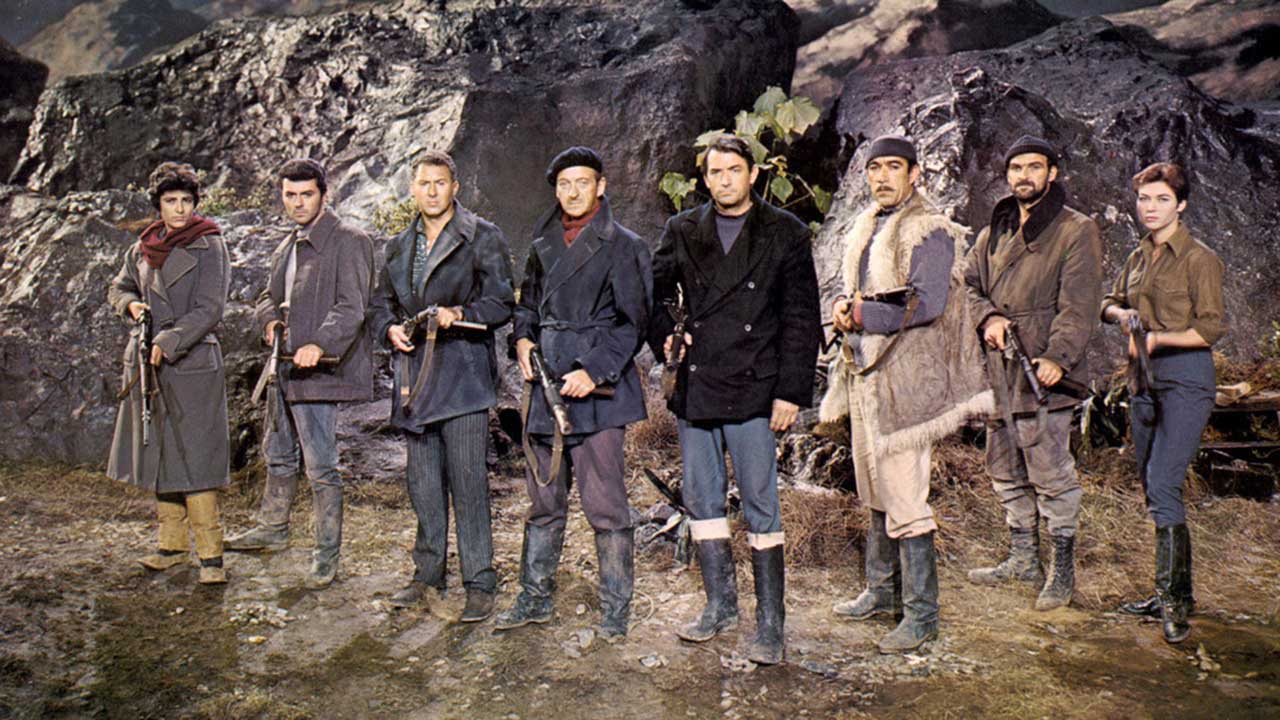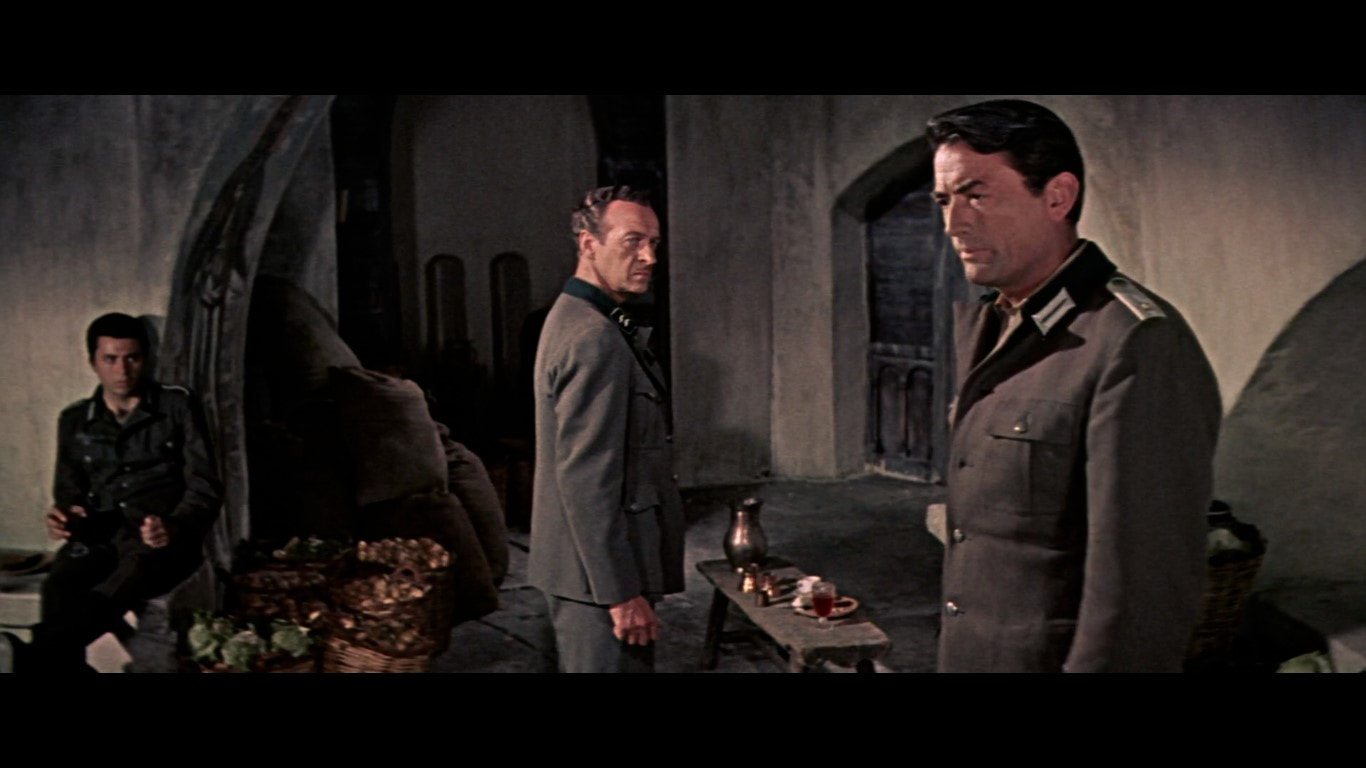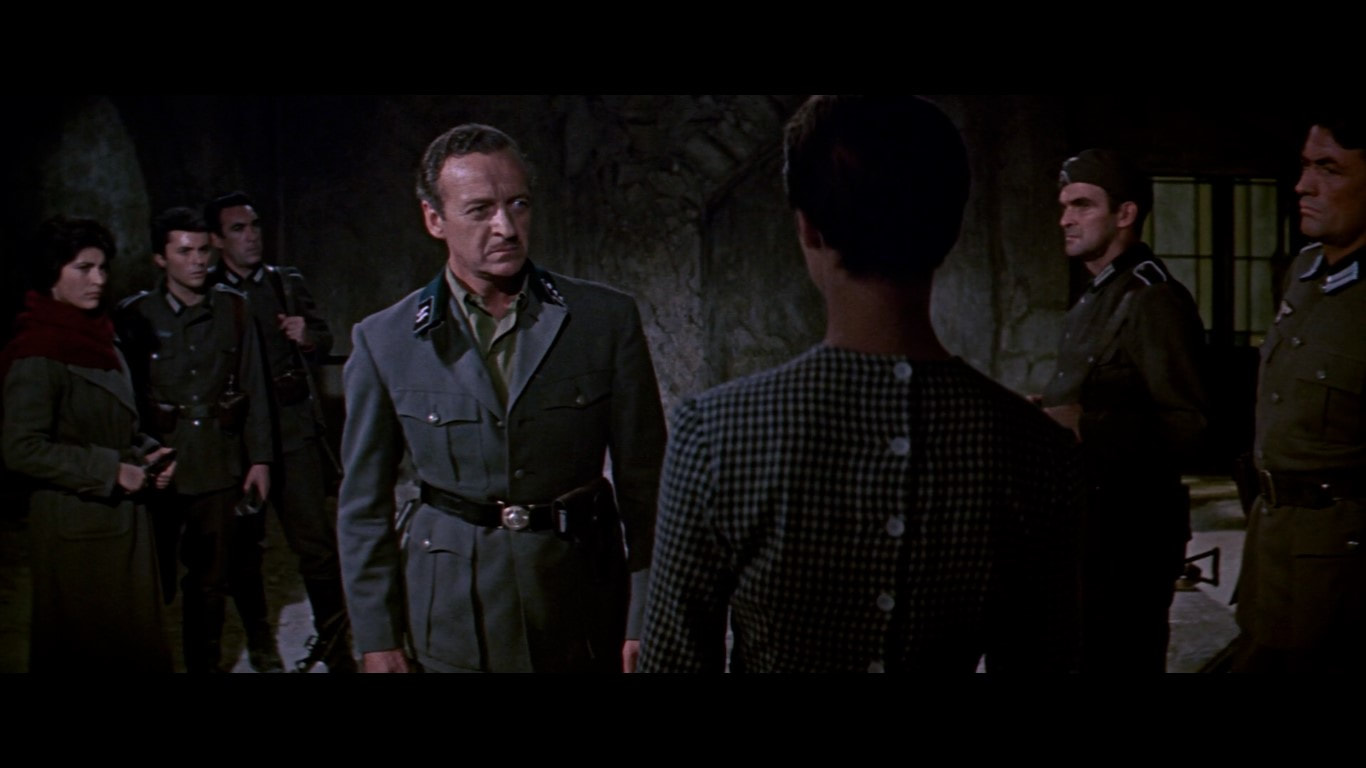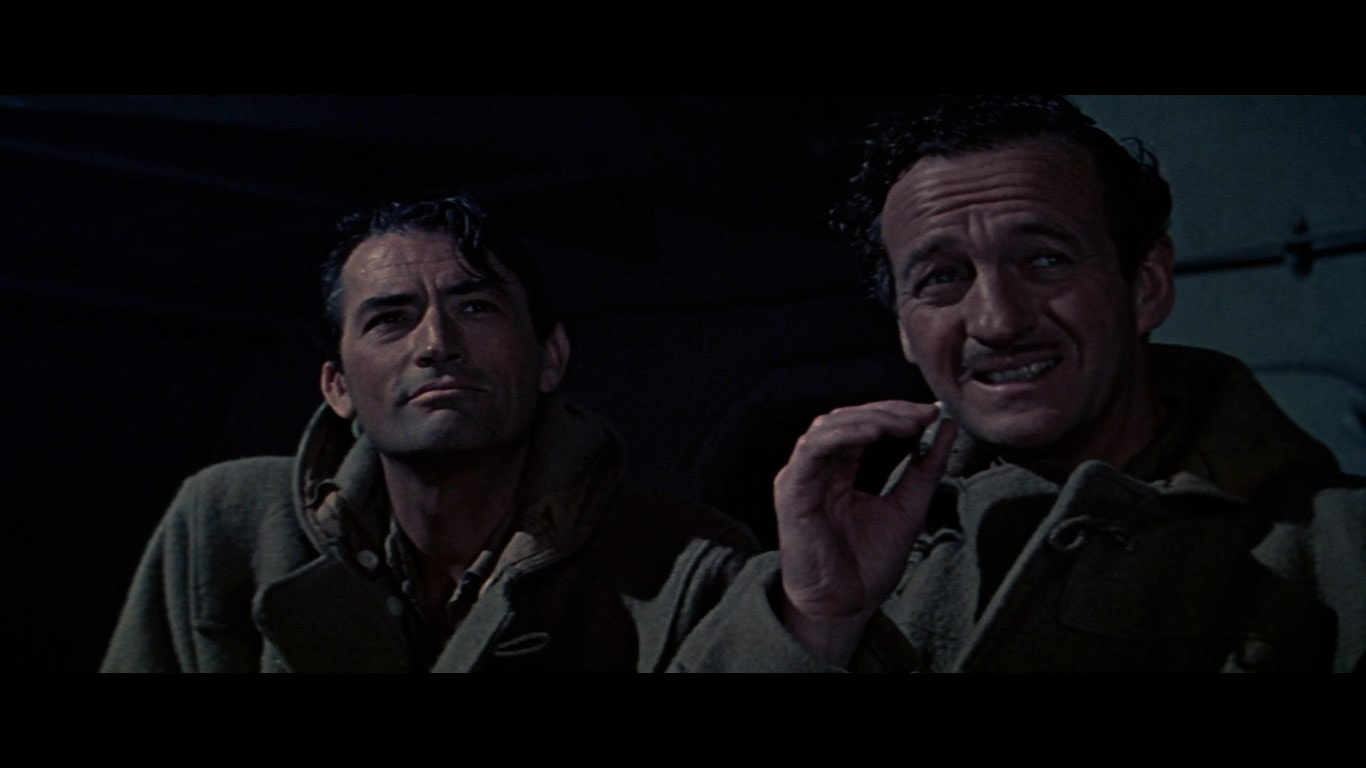HOW “THE GUNS OF NAVARONE” ALMOST CONFRONTS THE MORAL AMBIGUITY OF WAR – CLASSIC MOVIE MONDAYS #13/2/2020 Spoilers ahead. “War makes monsters of us all.” So goes the quote from George R.R. Martin’s fourth A Feast for Crows, the fourth in his A Song of Ice and Fire fantasy book series. I confess I am unaware of the context, having not read the book, and only managing to get about halfway through the first entry in the yet-unfinished series before having had to stop for reasons I do not remember; never having resumed my reading, I was thus unable to continue its pages in good conscious whilst not having remembered the immediate or prior context as to what section of whose story I was then in. Yet, as I watched David Niven and Gregory Peck word spar regarding the context in which Peck had left behind their injured mutual comrade to be tortured by the Germans, this quote from Martin’s acclaimed series would not leave my mind. Welcome to Classic Movie Mondays #1. The picture of choice in this case is 1961’s The Guns of Navarone, directed by J. Lee Thompson, adapted and produced for the screen by Carl Foreman from the novel by Alistair MacLean. Nominated for 7 Oscars (including Best Picture, Best Director, Best Film Editing, Best Adapted Screenplay, Best Sound, Best Original Score, and Best Visual Effects, the last of which it won), it stars David Niven, Gregory Peck, Anthony Quinn, Anthony Quayle, Stanley Baker, and James Darren as a rag-tag group of U.S. army men tasked with destroying two anti-naval guns, which use radar to detect any enemy vessels and sink them, so that the allies can mount an attack on the island of Navarone without risking any greater number of casualties than they already have. Along the way, the team encounters a great number of complications, including an enemy German vessel, a massive sea storm that takes their boat down with the water, and the need to scale the treacherous southern cliff of the island in order to get on it at all – it is this last effort that causes their leader, Major Roy Franklin (Anthony Quayle) to injure his leg, which in turn causes him to get gangrene, requiring either its surgical removal after a long journey to a Greek doctor or his immediate murder at the hands of his team in order not to slow them down. A little while later, having transported Franklin to a Greek medical facility with the aid of two women named Anna (Gia Scala) and Maria (Irene Papas), the team is captured by German forces, and after turning the tables on said forces, they quickly find a hide-out in which to stay the night, before their main operation is to commence the next day. Here we come to the first instance in which the film (and its main characters) attempts to confront the moral ambiguity of wartime maneuvers, especially under such desperate circumstances. Captain Keith Mallory (Gregory Peck), who has taken over leadership duties from Major Franklin, reveals to the team that he purposely fed false information to Franklin when they left him behind, stating that their orders had changed, and the destruction of the anti-naval guns was simply a diversion for a full-scale assault on the coast by the Turkish. Mallory believes that if the Germans attempt to torture Franklin, and ultimately decide to use something called scopolamine (a sort of truth serum) in order to gain information, Franklin will give them the false info, which he believes is actually true, thus drawing away any large-scale German units from the group’s main target, and concentrating them on the coastline. Corporal John Anthony Miller (David Niven) soon becomes upset by this development, confronting Mallory with a series of possibilities he may not have considered, namely that if the Germans don’t have or use any scopolamine, or Franklin dies before he gives up any information due to his resolve and goodness, Mallory will have wasted a truly decent human being on a gamble he doesn’t even have all that much certainty will work. He goes further on to say that he hopes, before their mission is concluded, that he gets the opportunity to use Mallory the way that Mallory has used Franklin. Mallory deflects the responsibility of the situation both during and in concluding the conversation by stating that his decision was “the only way [we’ve] got to get the job done” and that he “couldn’t think of any other way.” Just after the scene ends, however, we see Anna sneaking out of the room, unable to sleep, and coming to sit next to Mallory. He then asks her if what he had done was “civilized.” Mallory’s choice of words here is of particular interest. He did not ask Anna if his actions were right, if they were morally acceptable, or even if they were intelligent – he only asked if they were “civilized.” She, of course, doesn’t answer, and the movie throws in an awkwardly placed and forced kiss between the two that has no bearing on either the characters or story whatsoever, but it is interesting that the protagonist of a war film in the 1960’s is asking this question. Morally ambiguous protagonists were still on fairly shaky testing grounds during this time, not reaching their full force as leading characters until the 70’s, when directors like Coppola, Scorsese, and Kubrick were making some of what would become their most iconic films. To have the main protagonist of a war film so soon after WWII asking this question about whether it was “civilized” to sacrifice his own moral righteousness in the name of “getting the job done” would have been a bold avenue to explore, but instead the film simply moves on, as the operation works out, and the plan remains in motion. I cannot help but wonder: what would it have been like if the film had instead gone with one of the options that Miller listed, of possibilities that Mallory claimed to think about and decided were worth the risk anyway? Would we have a much different Best Picture winner from 1961? Would we, perhaps, have had a war film unafraid to confront the conflicting idealizations of both moral righteousness and effective soldiering (during a time when both of those things were on the cusp of dropping sharply in importance to the U.S. film landscape) ultimately take the gold from an iconic cross-racial musical? It is worth examining, in the context of the modern day, whether this commitment to “the job” above all else, including human life or moral responsibility, either helps or hurts our view of wartime protagonists. The second instance of the film’s hesitancy towards confronting moral ambiguity comes just moments before the main operation is to begin. Corporal Miller storms up a flight of stairs located in the team’s new shelter to inform the rest of the group that all of his main explosives have been disabled, and accuses Anna (the woman Capt. Mallory kissed earlier) of being a spy meant to foil their operation, citing the fact that there were only two times when his explosives were not under his supervision, and that after the first, they were still intact. It was after the second, during which only Anna watched over them, that they were found to be tampered with. He then goes on to suggest that they check for German torture scars on her back, which she claims to have, but has never let anyone see. Colonel Andrea Stavros then marches over towards her and forcefully rips open her dress from the back, revealing that she, in fact, has not one scar, bruise, or cut on its entire surface. She tells the group that they should believe what they see, saying that she “cannot stand pain,” going on to state that “it’s easy to be brave when you’re free, when you’re with your friends, but…no one helped me; I was alone. They said they would put me into their brothels, that they would torture me. I saw what they did to other people.” Miller and Mallory once again become involved in a heated debate about who should be the one to kill her. Miller states that he’s “not a born soldier,” and “got trapped.” He’s not anxious to kill anyone, preferring to leave the act to someone like Mallory, whom he considers a “leader of men – a hero.” Mallory begins to deflect, saying he never wanted any of this, but when Miller confronts him on the hypocrisy of letting the army make him an officer, thus giving Mallory that responsibility, Malory responds that “someone’s got to take the responsibility if the job’s going to get done.” What occurs next, however, directly contradicts the film’s conviction in this statement. As Mallory is about to execute Anna for her betrayal, Maria comes in and shoots her instead, relieving both Miller and Mallory of the burden of getting their hands dirty. This decision ultimately has no consequence on the shooter, nor causes any moral deliberation in Maria, as she goes on to the end of the film unscathed, but for the loss of her brother (who was part of the unit), which the movie hardly reflects on except to say that he “forgot” why they were there. The greater sin, however, on part of the film and its narrative, is that this last-second decision to have Maria ultimately be the one to execute Anna removes any responsibility from either Mallory or Miller, leaving the morals of both unscathed by any actions of legitimate consequence. Hollywood’s uncontestable approach to painting wartime protagonists (especially those from the U.S.) as heroes is understandable given the context in which this film was made, but one wonders if the film might have struck a more visceral truth, a more resonant chord by having its central characters actually follow through on these tough decisions they keep debating, owning that responsibility and conviction to carry out the job at any cost that they seem to value above all else; would the movie have thus aged better for it? I would not go so far as to say that I know for sure whether or not alterations in the narrative execution of this film, such as those mentioned here, would have been historically supported or maligned, but I am of the opinion that addressing the notion of moral ambiguity in war without having the courage to actually follow through on what that might entail, ultimately taking no true responsibility for those notions by relieving its characters of legitimate consequence, makes The Guns of Navarone a lesser film that it ultimately could have been. Let me conclude by saying I am in no way an expert on classic films (yet), war history, or any of the issues which I laid out above; it may be perfectly well that my takes on this film and the topics which I’ve chosen to focus on therein in the context of Hollywood’s output at that time is entirely misguided and/or misplaced to more educated minds. Nevertheless, I hope that in some small way, we have all explored an aspect of this film here today which we otherwise may not have considered if we weren’t looking for it, or if this were simply one of my regular reviews. I do encourage you to watch The Guns of Navarone for yourself and draw your own conclusions, and if it is of any interest, perhaps we can engage in our own discussions regarding this topic, or others relating to it. That will do it for this first installment of Classic Movie Mondays! I hope that you enjoyed reading it as much as I enjoyed writing it, and I cannot wait to continue this journey through Hollywood’s classics catalogue well into the future. Come back in April for the second installment of this series, and let me know in the comments below what you thought of today’s piece, as well as what classics you would like me to cover in the future! (I may even pick yours for a future entry. 😉)
- The Friendly Film Fan
0 Comments
Leave a Reply. |
AuthorFilm critic in my free time. Film enthusiast in my down time. Categories
All
|




